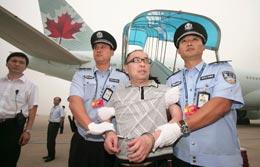China hunts fugitives in Canada

China's top legal supervisory body will launch a six-month campaign targeting suspects of corruption who have fled overseas, including Canada.
The campaign, announced last week by the Supreme People's Procuratorate - the nation's top prosecutor - will focus on investigations and establishing methods to bring suspects home, including extradition, repatriation and persuasion.
"The authority of the law must be resolutely upheld and crimes must be strongly [enforced] and deterred," it said, according to state run Xinhua.
The announcement also said prosecutors should work closely with other departments, including police and the central bank, to apprehend fugitives.
A source with knowledge of the campaign said Hong Kong would be the first target, followed by Canada and the U.S. North, Europe, Australia, Singapore and other nations in Southeast Asia.
According to a report by the Chinese Academy of Social Sciences, almost 20,000 officials fled overseas between 1995 and 2008 with assets totalling 800 billion yuan.
In 2011 alone, officials believe more than 1,500 fugitives left the country with nearly 8 billion yuan.
That number is likely to get bigger, as a growing number of party officials leave China with their families and ill-gotten gains as the nationwide anti-corruption campaign intensifies.
"It is clearly part of an increasing rhetorical and practical urgency to the anti-corruption campaign," said Rana Mitter, a professor of Chinese politics at the University of Oxford.
The campaign echoes a similar one spearheaded by the Ministry of Public Security in July, dubbed Fox Hunt, in which 88 suspects of financial crimes were extradited or returned on their own accord from 40 countries.
Fox Hunt also called for more efficient law enforcement agreements between China and countries such as the US and Canada, which have no extradition treaties with China.
Mitter said any attempt to return fugitives to China would run into difficulties, as the mainland's legal system did not meet international standards on, for example, guarantees of fair trials.
The term ‘naked officials’ first appeared in the Chinese media in 2008, when state prosecutors discovered a senior corrupt official was living alone in China and his wife, kid and mistresses had moved overseas. The term naked official has since become popular and even the government acknowledges it officially.
Beijing has just concluded a comprehensive audit of naked officials in the country. All local governments apart from the coastal province of Guangdong remain conspicuously silent about the number of naked officials within their ranks. Guangdong has reported 2190 naked officials whose families are living abroad on a permanent basis, one media report in the China Spectator said.
The career prospects of these officials are in limbo. They essentially have two choices: move their families back to China or leave their current posts. This is part of Beijing’s unprecedented crackdown on corruption.
The crackdown could have serious consequences for Australia: of 59 publicly documented cases of naked officials who have fled overseas, seven of them ended up in Australia, including one of the most senior officials on the run, Gao Yan, a former provincial governor of Jilin, party secretary of Yunan and former chief executive of State Grid.
Australia is clearly one of the top destinations for corrupted Chinese officials. Liu Tienan, a former vice minister of the powerful National Development and Reform Commission, the key economic planning agency was caught last year with a fake Australian passport and $2 million in cash.
Beijing has recently announced plans to go after corrupt officials who are living overseas. This could put a strain on the China/Australia relationship.
The Canadian experience is the best guide for Australia here: for years, Beijing has accused Canada of being a safe haven for the country’s financial fugitives. The most high profile was the case of Lai Changxing, who was an alleged smuggler and in the ‘90s was accused of a running multi-billion dollar smuggling operation, as well as bribing senior officials.
Beijing demanded Lai’s extradition for more than a decade. It became a major headache for Canadian officials as Lai attempted to delay his return to China by dragging it through the court system. He was eventually extradited on the explicit promise that he would not be executed by Beijing.
Another Canadian case involved Gao Shan, a former Bank of China branch manager in Harbin, who lived a modest life with his wife and daughter in Vancouver, Canada. He kept a low profile in the country, keeping his name off the mortgage, car registration and utility bills.
His identity and whereabouts were uncovered when he was involved in a car accident. Gao was soon arrested by the Canadian immigration authorities for his failure to report that he was an employee of the Bank of China. He had good reason to hide: he allegedly fled China with $180m stolen from his clients.
What makes his case more intriguing is his carefully planned exit strategy from China. Before he fled the country, he told his co-workers that his wife was studying in Beijing and his daughter was staying with her grandmother at his hometown. But in fact, his family had secretly moved to Canada and settled in Vancouver.









